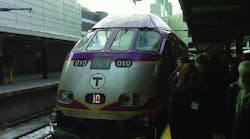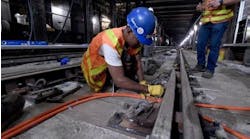Expense Control Points to $75 Million Cushion in MBTA Budget
The MBTA expects to come in $75 million under budget by the end of fiscal 2016 in June and plans to invest the savings into capital spending and substantially reducing the projected fiscal 2017 deficit, which has been estimated at $242 million.
With a projected $7.3 billion cost to bring the system into a state-of-good-repair, MBTA chief administrator Brian Shortsleeve told reporters Monday morning the operating expense savings pushed into pay-go capital would improve service for riders.
Through six months of fiscal 2016, operating expenses essentially did not increase compared to the first six months of fiscal 2015, and Shortsleeve anticipates a less than 1 percent increase in operating expenses by the end of the year, which would be less than at least the past 15 budget years.
"It's all about expense control," Shortsleeve told reporters ahead of a meeting of the T's Fiscal and Management Control Board.
The news arrives amid the control board's consideration of fare increases averaging 6.7 or 9.7 percent.
"Some say the MBTA hasn't earned a fare increase given the quality of service," Kristina Egan, of Transportation for Massachusetts, told the control board Monday. Urging fare increases of no more than 5 percent, she said that for those struggling the increases would be "a real hardship" and are unnecessary.
Gov. Charlie Baker has proposed another $187 million in bailout money for the T in the next fiscal year, which would equal the amount sent to the T in fiscal 2016.
Fares cover about 40 percent of cost of operating the system, Shortsleeve said.
Decisions about how to spend the operating money saved will be made after winter ends, Shortsleeve said. Using pay-go capital, as opposed to borrowed money, allows the T to move more quickly, Shortsleeve said. Noting the capital needs throughout the system, Shortsleeve said, "There is no surplus."
Equipment failures have led to substantial delays on the MBTA in recent months. Last week, a body panel fell from an Orange Line train, causing smoke and disabled trains at State Street Station.
Fiscal 2017 will include new financial challenges for the T, which is planning over the next two to three years to move 550 employees from the debt-funded capital budget onto the operating budget. That will add $52 million in expenses in fiscal 2017 and there will be another $12.5 million wage increase from collective bargaining and $10 million more in debt service payments, Shortsleeve said.
Shortsleeve said he hopes to reduce the administrative headcount at the transit agency by about 300 people, potentially outsourcing functions, and said other savings opportunities exist through pre-purchasing fuel and using Uber, Lyft and other ride-hailing companies to supplement the Ride paratransit service.
Lawmakers are drafting legislation intended to regulate Uber and Lyft, and Shortsleeve said the lack of regulation in the budding, smart-phone based ride-hailing industry would not be an impediment. He said paratransit users would use ride-hailing "as it exists."
"They would be using Uber and Lyft the way they do right now," Shortsleeve said.
Taxi drivers and others have called for a regulatory framework on par with the oversight of taxi companies.
A reduction in unscheduled absences has reduced the amount of overtime and the number of dropped bus trips, which is down 50 percent, Shortsleeve said. The MBTA has hired more than 90 bus drivers over the past three months, he said.



